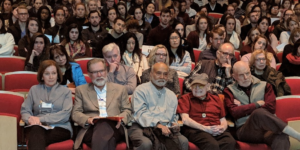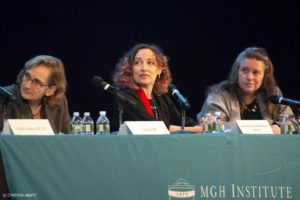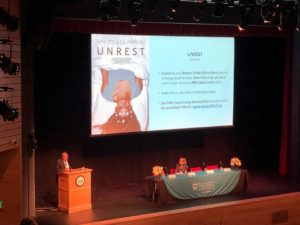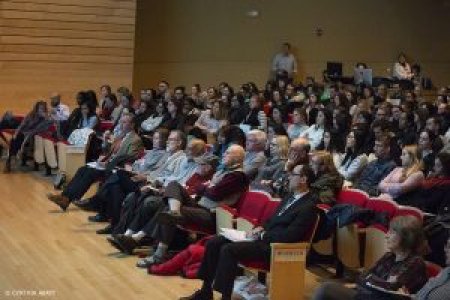Follow Rivka Solomon on Twitter: @RivkaTweets
“Now that’s the kind of event that gives hope. Real hope. Tangible, actionable hope. It’s infuriating that the standard of “care” for #Millions Missing is mostly built on disinformation. This kind of event is how we change this mad injustice.” – @RichardVallee on Twitter
Every now and then something happens in our global ME (myalgic encephalomyelitis) community that is both noteworthy and hopeful. Something that makes us believe things may actually change for the better. That’s what happened on January 15, 2019, in Boston, Massachusetts, a city known as a medical mecca because of its world-class medical schools and hospitals.
After a whirlwind year of organizing a dozen public events — at colleges, in hospitals and with our state’s Department of Public Health – using the best awareness-raising tool our community has ever had – the documentary Unrest, the Massachusetts ME/CFS & FM Association (“MassME”), a state advocacy organization, helped pull off the biggest shindig yet: An ME event with over 650 attending. (Scroll to bottom to view video of the event.)
The event host and organizer was MGH Institute of Health Professions (“the MGH Institute”), a highly respected graduate university founded by Boston’s elite Massachusetts General Hospital (MGH). The event audience was primarily 600 MGH Institute students, all studying to be, or already practicing as, nurses, physicians assistants, physical therapists, occupational therapists, speech therapists and more. Half were nurses. This event was their annual, mandatory Interprofessional Rounds, or “compassion lecture.” The audience also included around 65 additional faculty, healthcare professionals and members of the public.

MassME was thrilled when the MGH Institute approached MassME in 2018 to have ME be the focus of their 2019 program. Together, we titled the event “Invisible Disability: Providing Compassionate Care for a Person with ME/CFS (Myalgic Encephalomyelitis/Chronic Fatigue Syndrome).” With that title, we hoped the audience would come with an open mind and kindness — a much needed foundation for any discussion about ME, especially after decades of patients being neglected, delegitimized and wrongly psychologized.
The MGH Institute generously disseminated the event announcement to the larger Boston healthcare community. MassME did too. Together we got it placed in numerous e-newsletters and listservs at noteworthy institutions and schools. Disseminating an ME event announcement is a great awareness-raising tool and legitimizing agent, in and of itself.
The program moderator was Ron Tompkins, MD, ScD, Professor at Harvard Medical School; Director of the Center for Surgery, Innovation & Bioengineering at MGH; and Co-Director of the ME/CFS Collaborative Research Activities at MGH and the Harvard Affiliated Hospitals, an initiative funded by the Open Medicine Foundation (OMF).

The panelists were: Lisa Hall, RN, a senior nurse at Northampton Integrative Medicine who has been working with ME patients for 17 years; Robie Robitaille, a patient advocate with MassME and co-organizer of a virtual support group for patients; and me, Rivka Solomon, event coordinator with MassME, and advocate with #MEAction and OMF.
The event consisted of an excerpt of Unrest, Powerpoint slides, and Robie and I sharing our ME stories, including our (still) difficult journey securing appropriate healthcare. Because we are quite sick, we were not sure we could pull off the event until we actually sat in front of the microphones.
The audience gave us their full attention. If the big stack of “Q&A” questions was any indication, the attendees were highly engaged. We did not get to answer all of them, but soon after MassME was given the impressive full list of questions. These are the inquiries compassionate healthcare students and providers have about ME.
During the event, we asked the audience to sign up if they wanted our organization’s newsletter. Over 100 did. (You can too, here.)

After the program, the response was immediate and gratifying. One doctor said, “Amazing. What I saw was eye opening to someone who usually has his eyes open.”
A physical therapy student said he wanted to learn more. An occupational therapy student said the event sparked conversation among her peers from across multiple disciplines, and that, “the voices of the panel were definitely heard.” A journalist solidified her interest in writing about ME. Two staffers from a Boston disability organization discussed holding an event focused on chronic illness. A staffer from a state government agency assisting people with disabilities said he was glad he attended, learned a lot and talked about the need for more ME funding. We got great feedback. And soon we’ll get more; a whopping 600 evaluations from the program host.
Speaking of our host: A big “thank you” goes out to the well-organized, highly-collaborative staff and leaders at the MGH Institute. We believe they organized the largest in-person event ever held for ME. And to have most of the audience be healthcare students and professionals…? Wow!
Show your appreciation for the event: Thank the host!
Speaking of our host, please share your appreciation for the MGH Institute by signing this “thank you” card.
[maxbutton id=”19″ url=”https://www.kudoboard.com/boards/iNB1a4gO” text=”Sign the Card” ]
Want to dig in?
Here are links to the event program; press release; photos; the slides we presented; and the MGH Institute’s article and video of the entire event (found at the bottom of their article).
Watch the Event!
* (The slides don’t show up in the video but you can view them here.)






1 thought on “HUGE Event for ME in Boston”
I have had ME/CFS for over 25 years. Four things have helped me. 1) moving to a better climate. Heat drains me of my energy. 2) Viread. Although the XMRV virus was a red herring, Viread made a dramatic difference for me. It did make me worse for the first 10 or so days, then over a period off weeks I felt a dramatic improvement. 3) Nicotinamide Riboside (Elysium Basis) or NMN should work just as well. I started at a low dose (I do with everything) and now take 500 mg. twice a day. Without it I become cold and tire more easily. At age 71 I’m optimistic about the Salk institutes J147, Stanford’s telomere lengthening drug and other promising drugs that will add many years, possibly decades to our lives. If I’m going to be around for the cure I will have to live a lot longer. 4) Hope.
Comments are closed.